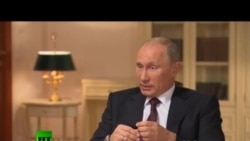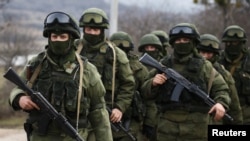The West must step up its efforts to combat and counter the information war being waged by its opponents, according to NATO officials. They warn that countries like Russia are exploiting the freedom of the press in Western media to spread disinformation.
The term "hybrid warfare" is frequently used to describe the tactics used by the Kremlin in its forceful takeover of Crimea in 2014, when unmarked, heavily armed gunmen now widely known as the ‘little green men’ began storming Ukrainian military bases in the region.
Moscow initially denied they were Russian military, yet weeks later similar unidentified armed units appeared in eastern Ukraine. That conflict between Russia-backed rebels and the Ukrainian military is still continuing.
The West is under attack
Speaking at this month’s United Nations General Assembly, Ukraine’s President Petro Poroshenko said hybrid warfare is being waged against the whole Western world.
“Political pressure, blatant propaganda, interference with the electoral process, economic coercion, secret subversive and military operations, cyberattacks, misuse of diplomatic measures, these are modern and congenial methods of the undeclared war,” Poroshenko said.
At a recent conference on Information Warfare at the London-based Royal United Services Institute, the Director of the NATO StratCom Center of Excellence Janis Sarts said the West is playing catch-up.
West not focused on this type of warfare
“The technology is ours. The marketing powerhouses are in our countries. Yet we’re having this discussion against the feeling of being pushed. Against the feeling of being pushed by different actors: Russia, Daesh… also China in more subtle ways,” said Sarts, using and Arabic term for the Islamic State.
The conference focused on the growing reach of Russian state media such as the 24-hour news channel Russia Today or RT, often accused of being a propaganda outlet for the Kremlin.
Senior editor at The Economist Edward Lucas argued channels like RT should not be considered as journalism.
“Russia has really grasped the post-truth environment. And they will lie about things absolutely brazenly. They understand the weaknesses of our media in the post-Cold War environment: that we prioritize fairness over truth.”
Russia investing big money
Lucas added the West should do more about what he termed "social media hygiene."
“There’s a real problem with comment fields, and with fake social media accounts, particularly on Twitter. The Russians are putting lots and lots of money into creating tens of thousands of trolls.”
Mark Laity, the chief of Strategic Communications at NATO’s Supreme Headquarters Allied Powers Europe or SHAPE, noted that Russia includes information strategy as a key pillar of its conflict planning, but in the West the communications are often handed off to separate public relations teams.
“We are still fighting on the margins,” he said, “when actually a properly funded, strategic communication effort is incredibly cheap compared to other costs.”
Laity warned Russia was deploying disinformation and hybrid warfare in its intervention in Syria — most recently in the disputed bombing of an aid convoy outside Aleppo earlier this month. He added the West must learn how to fight back.









